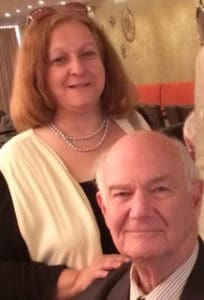Syril Levin Kline and Peter Kline: How We Became Oxfordians
December 3, 2021

As a man who loved the power of words, David Lloyd Kreeger was attracted to “the profundity of Shakespeare’s understanding of human nature in all its strengths and glory, its weaknesses and vices.” He recognized the playwright’s profound understanding of the law and other disciplines. At 81, the industrialist and philanthropist continued to be a lifelong fan of all things Shakespeare since first encountering the plays and sonnets in high school.
One summer evening in 1990, David welcomed my husband Peter and me to his home on Foxhall Road in Washington, D.C. (now converted into the Kreeger Museum), to talk about Shakespeare’s unique genius: that it did not stem from a random act of neurons, but from a passion for learning that received active nurturing from his tutors. Geniuses tend to seek out nurturing independently or are fortunate enough to be inspired and educated by those who recognize the gift. David was glad to hear that Peter, author of The Everyday Genius and 16 other books, shared that philosophy.
David had read extensively about the centuries-old authorship controversy. He was a very persuasive man and three years earlier organized a moot court on the authorship question at American University. Sitting on the bench were three of his personal friends: U.S. Supreme Court Justices William J. Brennan Jr., Harry A. Blackmun, and John Paul Stevens.
On the night of our 1990 visit, he won us over to the Oxfordian cause.
Peter told David that he had studied the authorship question during his Amherst College years and had tried to pursue his study in England, but a professor discouraged it. I had first heard about the authorship controversy in private school.
David was an amateur cartoonist, intrigued by the drawing of Shakespeare in the First Folio, and how its editor, Ben Jonson, challenged readers to “look not on his picture, but his book.” The cartoon-like image is very different from the fine engravings of Elizabethan authors published in books at the time. In the First Folio, “gentle Shakespeare” seems to be hiding behind a mask.
Our evening ended with David recommending that we read Charlton Ogburn’s The Mysterious William Shakespeare, with its foreword by historian David McCullough. “It’s the only major book you’ll need to read on the subject,” he advised.
But we soon discovered there was so much more! Peter and I built a good-sized Oxfordian library that moved with us to South Carolina last year.
David encouraged us to write a novel about the Shakespeare authorship for the average reader. He wondered how long it would take. Peter thought it would take a year.
Twenty years later, after hours of research, trial-and-error drafts and Oxfordian pillow talk with Peter, my novel, Shakespeare’s Changeling: A Fault Against the Dead (A Controversial Literary Historical Novel), was published thanks to the sponsorship of David’s son, Peter Kreeger. It won an International First Place Chaucer Award for Elizabethan/Tudor historical fiction and is based on Peter’s three unpublished nonfiction volumes on Lord Oxford’s life.
Peter passed away in December 2020. And sadly, David Lloyd Kreeger did not live to see the novel’s publication. He passed away in November 1990, six months after our visit.
— Syril Levin Kline
“How I Became an Oxfordian” is a series edited by Bob Meyers. You may submit your essay on this topic (500 words or less in an editable format such as MS Word), along with a digital photo of yourself, to: communications@shakespeareoxfordfellowship.org. Also include a sentence about yourself, e.g.: “John Smith is a business owner in Dallas.” You must be an SOF member to submit an essay.
To join the SOF see our membership page. To read other essays in this series, click here.
Membership dues cover only a fraction of our budget, including all our research, preservation and programming. Please support the SOF by making a gift today!
Blue Boar Tavern: Wassail Q&A
Tuesday Dec. 17, 8pm E / 5pm P
Sign up below for event invites!
